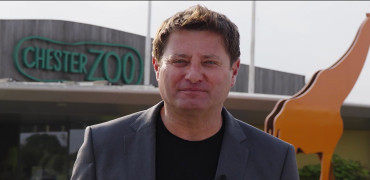Many people, including the British government, believe that installing air source heat pumps is the future for clean and green heating in our homes.
We also know that we need to be net zero carbon by 2050.
This transition is 100% the right thing to do for the benefit of the planet and for the benefit of future generations to come.
But we also know that this transition is not going to be easy.
TRANSITION is THE key word for every single industry across the globe and it is THE word I hear every day in my role as the brand Ambassador for Mitsubishi Electric Ecodan air source heat pumps.
Why? Because Mitsubishi Electric works unbelievably hard, as the industry leader, to help and support existing Gas Engineers make the TRANSITION from installing fossil fuel-burning gas boilers to installing renewable, clean, green energy air source heat pumps.
They have trainings centres across the country and online learning courses to help gas engineers make that transition – and the take up numbers are growing month by month.
It’s mind-boggling that there was no dedicated training for young heat pump engineers until 2023
Heat pumps for new-build
As I’ve mentioned many times here on ‘The Hub’ the government has set a target for 600,000 air source heat pump (ASHP) installs per year by 2028.
At the moment, the entire air source heat pump industry, is only installing just over 60,000 heat pumps per year. To grow the industry 10-fold in the next 4 years is a fantastic opportunity for the UK Housing industry and we have to grab it.
Legislation must be introduced by the new Labour Government to drive this ambition forward. The previous Conservative Government backtracked on a commitment for gas boilers to be banned in all NEW BUILD HOUSING by 2025, which was frankly a ridiculous turnaround.
I can understand that legislating for all existing homes to replace their existing gas boilers with ASHP would be a difficult thing to do, because not everyone can afford to do that, and because there are certain building types (especially apartments/flats) where it can be challenging (but not impossible) to do it because of where you might position the ASHP unit.
But, legislating for all house builders and developers to install ASHPs in ALL NEW BUILD HOUSING by 2025 was an absolute no-brainer and Labour absolutely need to bring this policy back and legislate for it.
We need an army
So, with so many existing properties still requiring the maintenance and upkeep of existing gas boilers and with so many new build homes being planned (300,000 new homes per year) that SHOULD ALL HAVE air source heat Pumps being installed in them, it is clear that we need an army of heating engineers that can work on both gas boilers AND install ASHPs.
The benefit of retraining existing gas boiler engineers is that it is very easy to make the transition to ASHPs because the skills for both are very similar.
RETRAINING gas engineers is vital for our TRANSITION to net zero.But, what about encouraging new, young engineers into the industry who have no experience at all?
How do we attract new, young blood into the industry?
A skills shortage
I have to be brutally honest and say that this is one of the biggest challenges the entire construction industry faces. This isn’t just a heating engineering issue. The entire construction industry is struggling to encourage young people to join the industry.
We have an enormous skills shortage. And we know exactly why.
In 2016 my good friend and a trustee of my ‘home education charity’ MOBIE, Mark Farmer, wrote a damning report, called ‘Modernise or Die’, which highlighted all the problems our industry faces with recommendations of what needs to be done to fix it.
One very important insight by Mark was that the UK Construction Industry has a big image problem. Young people simply aren’t attracted to construction because it is a seen as being a dirty, messy, inefficient industry full of predominantly male workers who eat unhealthy food, swear too much, have vans with tools in the back that look like they been in a hurricane environment for a week, and who only tun up to jobs as and when they feel like it.
In fairness not all builders are like this. I know many who are very professional and do a fantastic job, not only for their clients, but also in changing the poor image the industry has.
But there is no denying that we are massively struggling to recruit new talent to construction, when we are up against so many other cool companies and industries (Apple, Google, Meta, AI) that seem to appeal so much more to young people in the 21st century.
WE HAVE GOT TO CHANGE THIS.
Time for change
That means the INDUSTRY HAS TO CHANGE. It can’t just talk about it, it has to do it.
In fairness I believe it is beginning to make this change and is undergoing its own period of TRANSITION, but it also needs to create exciting generational change by taking on as many young apprentices as possible.
Unfortunately, we don’t have enough apprentices either. We desperately need more. There is a debate about whether we are struggling to have more construction industry and heating engineer apprentices because of our industry image problem, or is it because companies just aren’t offering enough apprenticeships jobs?
I think it’s both!
We desperately need more Heating Engineer apprentices. The construction industry as a whole currently has 80,000 job vacancies and that figure is only going to rise with the demand for new house building going up.
421K homes a year
In 2023 we built just over 230,000 new build homes. The new labour government want to build 300,000 homes per year over the course of their government.
A recent Financial Times Report claims that we actually need 421,000 new homes per year based on the population projections for 2023 to 2036.
If all of these new homes were legislated to install ASHPs rather than gas’s boilers, combined with many existing choosing to replace their old gas boilers with a new heat pump, we would certainly be getting closer to the 600,000 ASHP installs the government is calling for by 2028.
That is A LOT of new Homes and that is going to require A LOT of new heating engineers, hence why we need A LOT of new, young and talented apprentices.
He can’t get a job. We are struggling to find a company that will take him on.
Dedicated training
It is predicted that we need 57,000 qualified heat pump installers by the end of this decade.
I have to say i found it mind-boggling that there was no dedicated training provision for young heat pump engineers until 2023, when the new Low Carbon Heating Technician Apprenticeship was launched in the UK. It was developed by the MicroGeneration Certification Scheme (MCS) and the Institute of Apprentices and Technical Education (IfATE) and a trailblazer group of heat pump organisations.
The Department for Education will give up to £22,000 to every college for every apprentice they take on to the course, which is incredible, but there has to be more incentives to heating engineer companies to take apprentices on in the first place.
There are some incentives, but I’m not convinced that these go far enough. After a really difficult time in the UK construction industry caused by the terrible fall out from Brexit, Covid and Trussonomics, many companies are so busy trying to stay alive in the short-term that they aren’t really thinking about taking on apprentices for the long-term benefit of their businesses and the wider industry.
This has to change too!
Take on those apprentices
I recently encouraged a young lad (Alfie 17 years old) to take a look at the ASHP industry. He told me he was thinking of getting a trade in construction and was considering being a plumber (I told him that plumbers preferred to be called Gas Engineers these days!).
He didn’t know about air source heat pumps but was unbelievably keen to know more. I managed to arrange a few days’ work experience for him at Mitsubishi Electric.
He completed their online course, he had some basic training in the training centre with an Ecodan Training expert, had a little bit of experience with every department in the company over 4 days and came out absolutely buzzing.
He wants to complete the Low Carbon Heating Technician Apprenticeship and become a fully qualified Air Source Heat Pump Installer, which is absolutely fantastic.
But there’s a problem. He can’t get a job. We are struggling to find a company, close to where he lives with his parents, that will take him on.
So, the government can set as many targets as it likes, the industry can set up as many apprenticeship college courses as it likes, but if existing gas engineers (making the transition to heat pumps) or ASHP installers are unwilling or unable to take on young kids that want to work in the industry, then nothing is going to change.
We really need to encourage more apprentices to the heat pump Industry, which means the image of our industry must change, we need to make young people more aware of the exciting opportunities our industry can give them, but more than anything we need to give employers all of the encouragement and incentives we can to take on the thousands of young apprentices the home heating desperately needs.
Note - I’d like to dedicate this article to David W. Johnson. David was a wonderful architect who ran a very small architectural practice in my hometown of Washington, Tyne + Wear. He took me on as a young architectural apprentice in 1990 when I was just 16 years old and funded my part-time day release course in Building & Construction at Wearside college where I went to for one day per week and worked for David for 4 days a week. I absolutely loved my apprenticeship, and the opportunity David gave me changed my life forever. There is no way I’d be where I am today without David’s sharing his incredible knowledge with me and showing me so much kindness and support. Unfortunately, David passed away this month.
George Clarke is an architect, writer, TV presenter and Ecodan Ambassador




